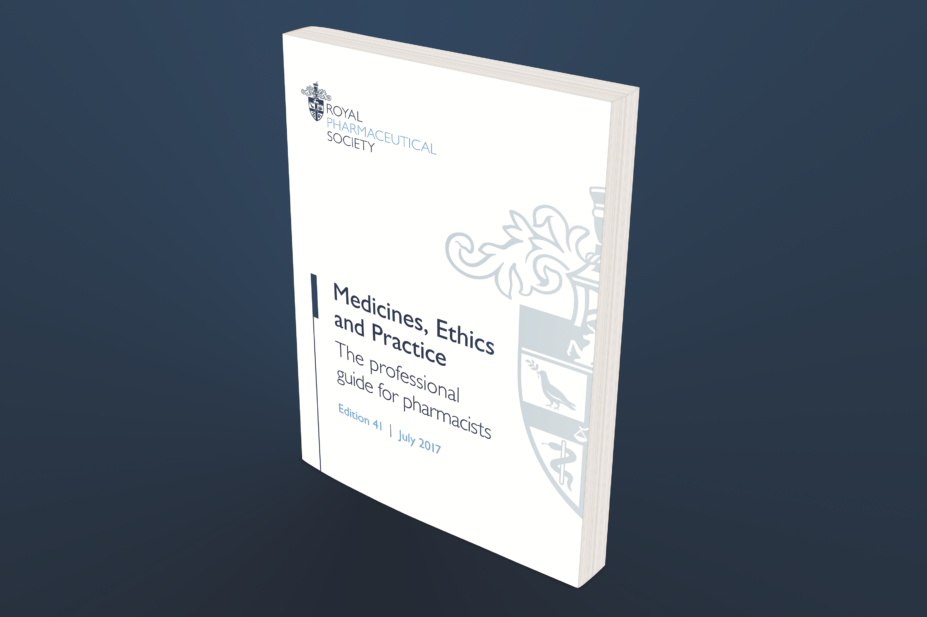
Royal Pharmaceutical Society
Edition 41 of Medicines, Ethics and Practice (MEP) will be distributed with the July issue of The Pharmaceutical Journal and will be available to download from the Royal Pharmaceutical Society (RPS) website from 31 July 2017.
This year, there are two new sections. The first, “Prescribing and dispensing to the same person”, is aimed at providing guidance to pharmacist prescribers on appropriateness of prescribing and then dispensing. This section was introduced following enquiries from members and discussion by the MEP advisory group, said Wing Tang, senior professional pharmacist for standards and professional support, who led on this year’s revisions.
“Normally, these are separate functions, for patient safety reasons,” says Tang. “Ideally, the person who prescribes should not be the same person who dispenses as patient safety is improved by the opportunity for another pharmacist to interact with the patient and check clinical appropriateness. But not all circumstances fit that scenario.”
The new guidance signposts to the Crown Report — Review of prescribing, supply and administration of medicines — as well as NHS Education for Scotland (NES) and Nursing and Midwifery Council (NMC) recommendations. The guidance is clear that while prescribing and dispensing to the same person should not be the norm, where this occurs it must clearly be in the patient’s best interests, and there should be an audit trail of reasons why it was necessary.

Courtesy of Wing Tang
Wing Tang, senior professional pharmacist for standards and professional support, oversaw this year’s revisions.
The second new section covers new psychoactive substances (NPS) — defined as synthetic drugs used recreationally, which are not subject to international control. Pharmacists — especially those working in secure environments and hospitals — are increasingly likely to encounter users of these “legal highs”, says Tang. The guidance outlines what pharmacists should know about NPS and points to sources of further information, particularly relating to interactions.
Several chapters of the MEP have been revised for the 41st edition. The section on continuing professional development (CPD) has been updated to reflect expected changes in General Pharmaceutical Council (GPhC) requirements for revalidation. “As the model is still being developed by the GPhC, interim changes have been made for this edition.”
For example, the notes pages have been reformatted: “When using MEP for learning or solving problems has had an impact on your practise, quick notes can be made as a reminder on these pages at the time,” Tang says, adding that “This can be helpful later whether you are completing CPD entries, including through RPS Faculty or Foundation e-portfolios.”
Another update, to the section on delivery and posting of medicines to patients, emphasises that internet pharmacies must display the EU common logo and that medicines being supplied to customers in the EEA must be licenced for use in the destination country. This is not a new requirement, Tang says, but “it would be helpful to raise awareness of this”.
The UK internet pharmacy industry, he says, has grown rapidly compared to other European countries. This has led to increasing numbers of UK-registered online pharmacies selling medicines across Europe, hence the reminder.
Finally, the GPhC regulatory standards included as appendices to the MEP have been revised. “GPhC have made quite a lot of changes this year — the standards for conduct, ethics and performance were superseded by the standards for pharmacy professionals,” Tang says. MEP 41 reproduces these new standards and also includes new guidance from GPhC on consent, confidentiality and maintaining sexual boundaries.
Get involved with MEP 42
“We really appreciate input from members to help us to keep MEP useful, practical and relevant,” Tang says. The RPS professional development and support team, who use MEP to support their responses to members’ inquiries, identify areas for addition or clarification based upon their interactions with members.
The RPS also works with a volunteer advisory panel who commit time to read, review and discuss topics for MEP, and Tang is keen to encourage more members to join the panel. “We would like to call out to people who might want to be involved in the next cycle. We would like volunteers from all sectors and geographic areas,” he says, adding that pharmacists at all stages of their career, from student to retired, are valued.
In particular, he says, students are welcome to get involved. “We could use some more aspiring pharmacists. The students we’ve had from previous cycles have now started their pre-registration year or become pharmacists.”
Those who would like to assist, but cannot commit to joining the panel, can send ad-hoc feedback to the support service. “If there’s something that members spot and want to suggest that the advisory group look at for the next cycle, they should get in touch. We’re really interested in talking to members. Feedback from people who use MEP every day is what helps it to evolve.”
To join the MEP 42 expert advisory panel, email wing.tang@rpharms.com
To send ad-hoc feedback on MEP 41, email the support team on support@rpharms.com

